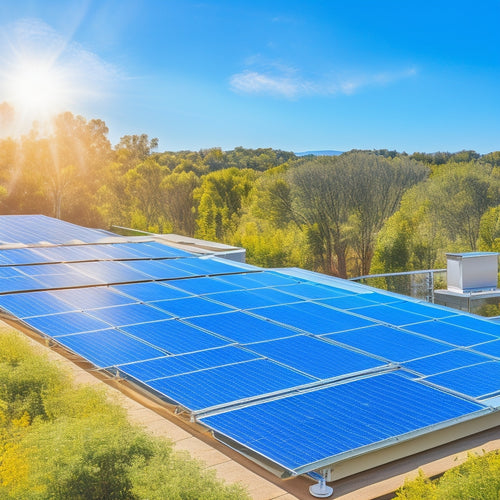
What's the Cost of Home Energy Storage Systems?
Share
Your cost of installing a home energy storage system typically ranges from $8,000 to $15,000 or more, depending on factors such as system size, battery type, and installation complexity. You'll need to evaluate your energy usage patterns and desired level of grid independence to determine the right system size for your needs. The quality of equipment and efficiency ratings will also impact costs. Additionally, you'll want to take into account installation and maintenance expenses, as well as potential incentives and rebates. As you weigh your options, you'll find that understanding the intricacies of energy storage costs can lead to significant long-term savings and a solid return on investment - and there's more to investigate.
Key Takeaways
- The cost of home energy storage systems depends on system size, battery type, and installation complexity, with larger systems typically incurring higher upfront costs.
- Battery type and quality significantly impact overall system cost and performance, with lithium-ion batteries generally being pricier but offering higher energy density and longevity.
- Installation costs are influenced by labor costs, required permits, and techniques, with roof-mounted systems often being more complex and expensive than ground-mounted ones.
- Federal and state incentives, such as tax credits and rebates, can offset installation and maintenance costs, making energy storage systems more cost-effective.
- Long-term savings from reduced grid reliance and optimized energy usage can yield a significant return on investment, with some systems paying for themselves within 5-7 years.
Understanding Solar Energy Storage Costs
With the increasing adoption of solar power, understanding the costs associated with energy storage systems is vital for homeowners and businesses alike.
You'll want to take into account the storage capacity you need, which depends on your usage patterns and desired level of grid independence. Efficiency ratings of the system also play a notable role in determining costs, as they affect how much energy is wasted during charging and discharging.
The type and quality of equipment high-quality equipment used in the system can greatly impact overall system cost and performance.
Battery lifespan is another important factor, as it impacts the overall cost of ownership. Additionally, you'll need to take into account the environmental impact of the system, including the production and disposal of batteries.
System Size and Battery Type Factors
You've carefully assessed the factors that influence the overall cost of your energy storage system, from storage capacity to equipment quality and environmental impact.
Now, it's time to explore the specifics of system size and battery type. The system capacity you need depends on your energy usage and the amount of backup power you require. A larger system capacity generally means a higher upfront cost.
When evaluating battery options, it's crucial to examine advanced battery management systems that optimize charging and discharging for better performance, as well as high energy density that maximizes power in limited space.
The type of battery you choose also plays a significant role in the overall cost. Different battery chemistries, such as lithium-ion or lead-acid, have varying price points and performance characteristics.
For example, lithium-ion batteries tend to be more expensive than lead-acid batteries but offer higher energy density and longer lifetimes.
Understanding these factors will help you make an informed decision about your energy storage system.
Installation and Maintenance Expenses
Several factors contribute to the overall installation cost of your energy storage system, including the complexity of the installation, labor costs, and any necessary permits or inspections.
You'll also need to take into account the installation techniques used, such as whether your system requires a roof-mounted or ground-mounted installation, which can impact labor costs and complexity.
Additionally, it's crucial to verify that the inverter efficiency matches the battery configuration for peak performance inverter efficiency, and that communication protocols are compatible with the system.
You'll also need to factor in ongoing maintenance expenses, including regular battery checks and software updates.
To minimize these costs, it's crucial to establish a regular maintenance schedule with your installer or a qualified electrician.
Incentives and Rebate Opportunities
Your energy storage system's installation and maintenance expenses are just one aspect of its total cost of ownership.
Fortunately, you can offset these costs with federal incentives and state rebates. The federal government offers a 26% tax credit for qualified energy storage systems installed in your home.
Additionally, many states provide rebates for energy storage system installations, which can range from a few hundred to several thousand dollars.
You'll need to research and review the specific incentives available in your area, as they can vary greatly.
Long-Term Savings and ROI
Energy storage systems can considerably reduce your reliance on the grid, leading to substantial long-term savings on your utility bills.
By optimizing your energy usage and reducing peak demand, you'll enjoy lower energy costs and increased energy efficiency. As you achieve greater grid independence, you'll also minimize your environmental impact and enhance your energy security.
Over time, these savings can add up, providing a significant return on investment (ROI) for your energy storage system. In fact, some systems can pay for themselves in as little as 5-7 years, depending on your energy usage and local incentives.
Frequently Asked Questions
Can I Use a Home Energy Storage System With a Non-Solar Power Source?
You can use a home energy storage system with a non-solar power source, as long as you comply with home energy regulations; recent battery technology advancements have made it possible to store energy from various sources, including grid, wind, or hydro power.
Are Home Energy Storage Systems Environmentally Friendly and Sustainable?
As you venture into the domain of home energy storage, you'll find that these systems are environmentally friendly and sustainable, boasting a minimal lifecycle impact and optimized energy efficiency, making them a green powerhouse for your abode.
Do Home Energy Storage Systems Provide Backup Power During Outages?
You'll get backup power during outages with a home energy storage system, but the duration depends on the outage duration and your battery capacity - a larger capacity means more hours of backup power, ensuring your essential appliances stay on.
Can I Monitor and Control My Energy Storage System Remotely?
You're "on the same page" as the latest technology, and yes, you can monitor and control your energy storage system remotely, leveraging advanced remote monitoring capabilities for seamless energy management and peak performance.
Are Home Energy Storage Systems Compatible With My Existing Electrical Panel?
You'll need to verify your home energy storage system is compatible with your existing electrical panel, meeting specific installation requirements, such as voltage and amperage ratings, to assure a safe and efficient energy flow.
Related Posts
-

Top Eco-Friendly Camping Equipment for a Sustainable Adventure
When you're camping with the planet in mind, opt for eco-friendly gear like tents made from recycled materials and bi...
-

What Types of Solar Energy Devices Are Available
You'll find several types of solar energy devices available today, each customized to different energy needs. Photovo...
-

Essential Hiking Lights for Safety and Fun
When you're hitting the trails, essential hiking lights are vital for safety and fun. A lightweight headlamp offers h...


